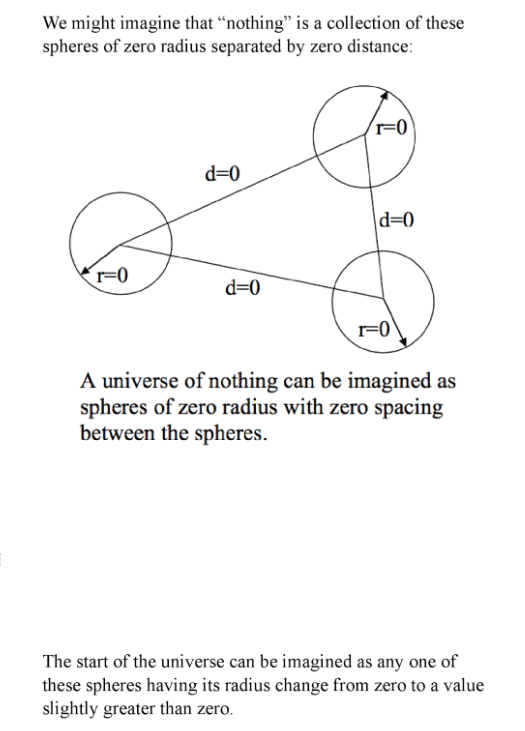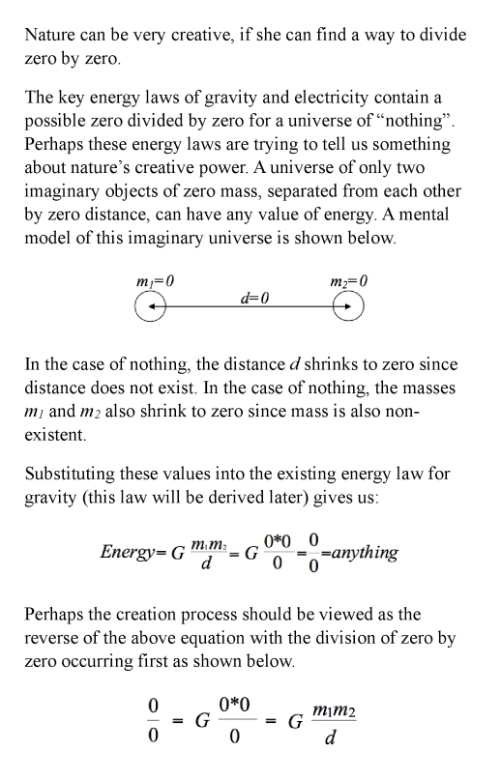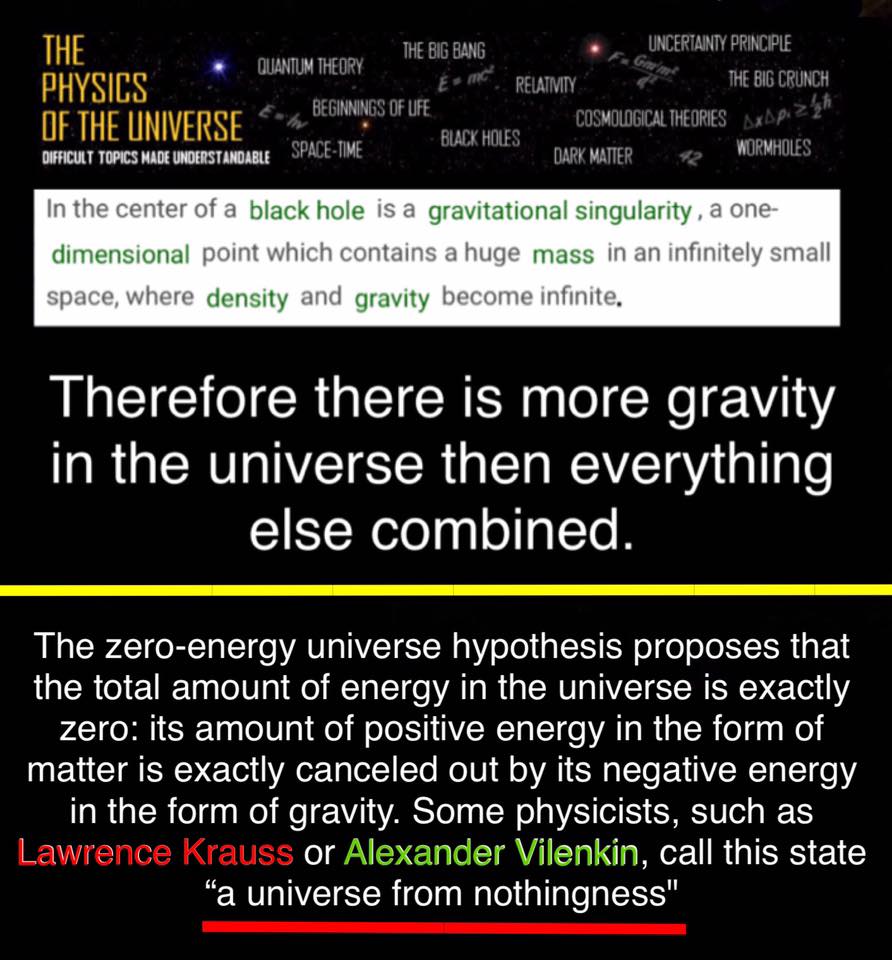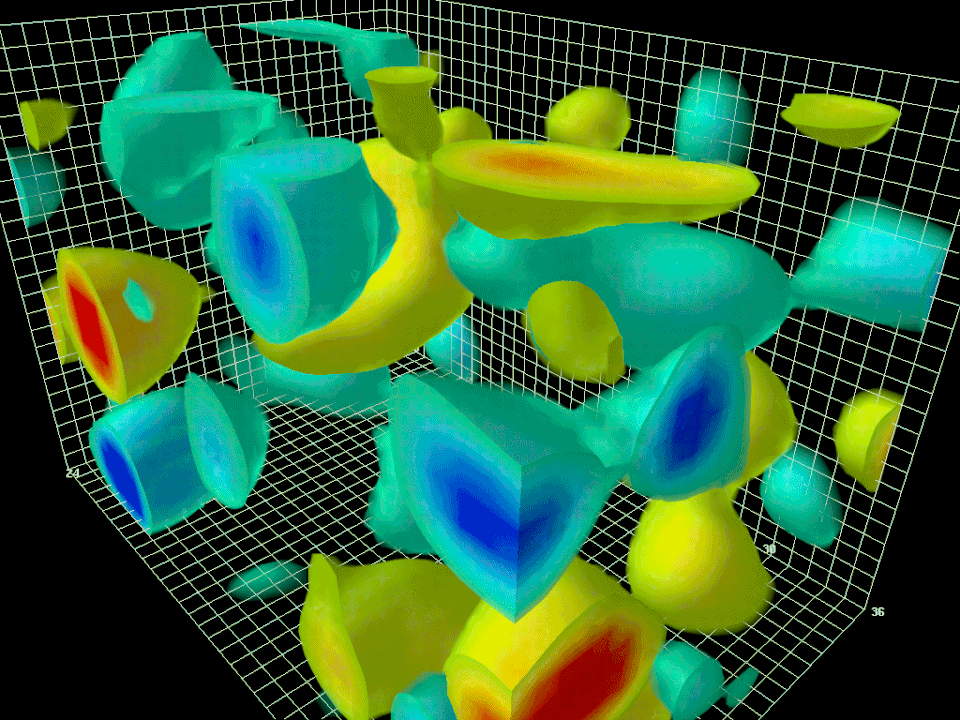Virtual particles require a quantum vacuum. What was the cause of the vacuum ?
https://reasonandscience.catsboard.com/t1317-virtual-particles-require-a-quantum-vacuum-what-was-the-cause-of-the-vacuum
Atheism is perfectly at home with all kinds of idiocy, superstition, and irrational nonsense like “a universe from nothing”
1. It is claimed that virtual particles caused the Big bang, and the universe into existence.
2. Virtual particles depend on a quantum vacuum, field, or bubble, which is an energy state in space. The energy in space is not nothing.
3. In order to have a quantum vacuum and field, the laws of physics are still there. That includes the electromagnetic field, the gravitational field, the Higgs field, and the fields arising from the nuclear forces. Spacetime is still there, governed by General Relativity. The fundamental constants are all still in place, all with the same values we observe them to have. And, perhaps most importantly, the zero-point energy of space is still there, and it's still at its current, positive, non-zero value. This is where the phrase, "a Universe from nothing" comes from. That's still a lot of something, and not nothing at all. The origin of all these things still demands an explanation.
4. The quantum vacuum and field require an explanation of its existence. The first cause argument of God's existence is not refuted by claiming that virtual particles caused the Big bang.
Dongshan He, Spontaneous creation of the universe from nothing 4 abril 2014
the universe can be created spontaneously from nothing. When a small true vacuum bubble is created by quantum fluctuations of the metastable false vacuum, it can expand exponentially
https://arxiv.org/abs/1404.1207v1
Claim: Metastable quantum field. Energy potential in the absense of matter. Quantum fluctuation condenses it into virtual particles of matter and antimatter. They created the Big bang, and our universe.
Reply: Virtual particles, and the quantum vacuum generating them, are far from absolutely nothing.
This is what physicists mean when they talk about nothing: Nothingness is the void of empty space. They mean however something different than "no things" at all. In order to achieve nothingness, one has to get rid of every fundamental constituent of matter. Every quantum of radiation has to go. Every particle and antiparticle, from the ghostly neutrino to whatever dark matter is, must be removed. Then there would be empty space itself. With no particles or antiparticles, no matter or radiation, no identifiable quanta of any type in the Universe, there would still be empty space itself. To some, that's the scientific definition of "nothingness." But certain physical entities still remain, even under that highly restrictive and imaginative scenario. The laws of physics are still there, which means that quantum fields still permeate the Universe. That includes the electromagnetic field, the gravitational field, the Higgs field, and the fields arising from the nuclear forces. Spacetime is still there, governed by General Relativity. The fundamental constants are all still in place, all with the same values we observe them to have. And, perhaps most importantly, the zero-point energy of space is still there, and it's still at its current, positive, non-zero value. This is where the phrase, "a Universe from nothing" comes from.
Lets contrast it now with absolutely nothing, or the philosophical nothingness: True Nothingness only occurs when you remove the entire Universe and the laws that govern it. We can conceive of removing everything we can imagine: space, time, and the governing rules of reality. Physicists have no definition for anything here; this is pure philosophical nothingness. The question is, of course: If the nothing that physicists like Krauss talk about, entails the existence of the laws of physics, the quantum fields, the electromagnetic field, the gravitational field, the Higgs field, and the fields arising from the nuclear forces, spacetime, governed by General Relativity, the fundamental constants, the zero-point energy of space, and still at its current, positive, non-zero value, which manifests itself as dark energy, then the question is: Where did ALL THIS come from ?? It's not, as many think, just virtual particles popping in and out from a quantum vacuum. Its much more. As seen that's still a lot of something, and not nothing at all. The origin of all these things still demands an explanation.
How does Krauss claim we get a universe from nothing? He writes:
This is an example of something that Guth coined as the ultimate free lunch. Including the effects of gravity in thinking about the universe allows objects to have—amazingly—“negative” as well as “positive” energy. This facet of gravity allows for the possibility that positive energy stuff, like matter and radiation, can be complemented by negative energy configurations that just balance the energy of the created positive energy stuff. In so doing, gravity can start out with an empty universe—and end up with a filled one. (Krauss, 2012: 92)
This original empty space is highly structured, first by gravity. But gravity cannot be decoupled from energy. By E = mc2, energy can be transformed into matter. Then gravity can transform matter into the galaxies that provide the home for humans. If the original empty space is structured by the law of gravity that is essentially connected to energy, you’ve really got something there. Not nothing. In short, for Krauss, nothing is not really nothing. Krauss’s quantum vacuums are highly structured somethings. So the world does not come from nothing. The somethings it comes from—that bubbling soup of energy and mass or the laws of physics or gravity/energy—make one wonder. Where do they come from? Surely not from nothing (ex nihilo, nihil fit).
It is claimed that Virtual particles are indeed real particles. Quantum theory predicts that every particle spends some time as a combination of other particles in all possible ways. Quantum mechanics allows, and indeed requires, temporary violations of conservation of energy. So they are in time, in space, and require a quantum vacuum, in the lowest state of energy. So we have to ask: What caused the energy, space, and time in which these particles pop up?
The net energy of the universe is zero
The attempt to draw metaphysical implications from the zero net energy hypothesis is a bad joke. It’s like saying that if your debts and your assets exactly cancel each other out, so that your net worth is zero, then there is no cause of your current financial condition. The suggestion that nothing exists is absurd. Not only do I undeniably exist, but according to the hypothesis, the positive and negative energy exist. So as Christopher Isham, Britain’s premier quantum cosmologist, points out, there still needs to be “ontic seeding” to create the positive and negative energy in the first place.
"Net energy is zero" is what is called a construct. It's like "the average family with 2.4 children". It's not an actual object you can point to, but something you get when you run the calculations for positive and negative elements. Do you know what you have when you have positive and negative elements? Elements. That's not nothing, that's something. Something that 1) doesn't have to exist and 2) logically cannot exist eternally. So we're back to the same question. If non-physical causation is a non-starter for you, either offer an explanation that's physical that doesn't suffer from those problems of offer an explanation as to why non-physical explanations are so repulsive.
Here, Krauss goes to the point to claim that ABSOLUTELY NOTHING could have created the universe. Thats the suicide of reason and logic
https://www.youtube.com/watch?v=ghLSHorrcoQ
God most probably exists - The universe had a beginning, therefore a cause
https://www.youtube.com/watch?v=g9UMDiiE0kY&t=327s
Nothing is the thing that stones think of
https://reasonandscience.catsboard.com/t2817-nothing-is-the-thing-that-stones-think-of
https://reasonandscience.catsboard.com/t1317-virtual-particles-require-a-quantum-vacuum-what-was-the-cause-of-the-vacuum
In quantum field theory, the quantum vacuum state is the quantum state with the lowest possible energy. The vacuum electromagnetic field in spontaneous emission, the Lamb shift, van der Waals, and Casimir forces, and a variety of other phenomena, some of which are of technological as well as purely scientific importance.
https://www.sciencedirect.com/book/9780080571492/the-quantum-vacuum
Luke Barnes, a non-creationist astrophysicist who is a Postdoctoral Researcher at the Sydney Institute for Astronomy, University of Sydney, Australia, is scathing about Krauss and those who argue like him:
First and foremost, I’m getting really rather sick of cosmologists talking about universes being created out of nothing. Krauss repeatedly talked about universes coming out of nothing, particles coming out of nothing, different types of nothing, nothing being unstable. This is nonsense. The word nothing is often used loosely—I have nothing in my hand, there’s nothing in the fridge etc. But the proper definition of nothing is “not anything”. Nothing is not a type of something, not a kind of thing. It is the absence of anything.
Physicist and philosopher David Albert
The fact that particles can pop in and out of existence, over time, as those fields rearrange themselves, is not a whit more mysterious than the fact that fists can pop in and out of existence, over time, as my fingers rearrange themselves. And none of these poppings—if you look at them aright—amount to anything even remotely in the neighborhood of a creation from nothing.—
Lee Strobel, A case of a creator :
Quantum theory ... holds that a vacuum ... is subject to quantum uncertainties. This means that things can materialize out of the vacuum, although they tend to vanish back into it quickly... . Theoretically, anything-a dog, a house, a planet-can pop into existence by means of this quantum quirk, which physicists call a vacuum fluctuation. Probability, however, dictates that pairs of subatomic particles ... are by far the most likely creations and that they will last extremely briefly.... The spontaneous, persistent creation of something even as large as a molecule is profoundly unlikely. Nevertheless, in 1973 an assistant professor at Columbia University named Edward Tryon suggested that the entire universe might have come into existence this way.... The whole universe may be, to use [MIT physicist Alan] Guth's phrase, "a free lunch."20 I closed the magazine and tossed it on Craig's desk. "Maybe Tryon was right when he said, `I offer the modest proposal that our universe is simply one of those things which happen from time to time.' “ Craig was listening intently. "Okay, that's a good question," he replied. "These subatomic particles the article talks about are called `virtual particles.' They are theoretical entities, and it's not even clear that they actually exist as opposed to being merely theoretical constructs. "However, there's a much more important point to be made about this. You see, these particles, if they are real, do not come out of anything. The quantum vacuum is not what most people envision when they think of a vacuum-that is, absolutely nothing. On the contrary, it's a sea of fluctuating energy, an arena of violent activity that has a rich physical structure and can be described by physical laws. These particles are thought to originate by fluctuations of the energy in the vacuum. "So it's not an example of something coming into being out of nothing, or something coming into being without a cause. The quantum vacuum and the energy locked up in the vacuum are the cause of these particles. And then we have to ask, well, what is the origin of the whole quantum vacuum itself? Where does it come from?" He let that question linger before continuing. "You've simply pushed back the issue of creation. Now you've got to account for how this very active ocean of fluctuating energy came into being. Do you see what I'm saying? If quantum physical laws operate within the domain described by quantum physics, you can't legitimately use quantum physics to explain the origin of that domain itself. You need something transcendent that's beyond that domain in order to explain how the entire domain came into being. Suddenly, we're back to the origins question."
Krauss - a universe from nothing
https://reasonandscience.catsboard.com/t2594-krauss-a-universe-from-nothing
Krauss: Indeed, the immediate motivation for writing this book now is a profound discovery about the universe that has driven my own scientific research for most of the past three decades and that has resulted in the startling conclusion that most of the energy in the universe resides in some mysterious, now inexplicable form permeating all of empty space. It is not an understatement to say that this discovery has changed the playing field of modern cosmology. For one thing, this discovery has produced remarkable new support for the idea that our universe arose from precisely nothing.
Answer: If we define nothing as the absence of anything, then the assertion that the universe arose from precisely nothing is hogwash and pure irrational nonsense. Nothing is the absence of anything and has no properties, not potentiality, it can't change the state of nothingness. That's OBVIOUS to any average intelligent mind.
Krauss: And if inflation indeed is responsible for all the small fluctuations in the density of matter and radiation that would later result in the gravitational collapse of matter into galaxies and stars and planets and people, then it can be truly said that we all are here today because of quantum fluctuations in what is essentially nothing.
Answer: This is probably the essence or core assertion of the book, and essentialy makes as much sense as a quacking duck :=P .
http://www.bethinking.org/is-there-a-creator/a-universe-from-someone-against-lawrence-krauss
In the face of the logically coherent answer supported by the Leibnizian cosmological argument, Krauss would dearly like to change the topic: "what is really useful is not pondering this question…" As a result, he produces a book that’s overwhelmingly devoted to questions besides the one on the front cover. Krauss anti-philosophical prejudice leads him to embrace a verificationalist stance long ago abandoned by philosophers as self-contradictory and to toy with rejecting the ultimate question of origins as meaningless. Despite this, Krauss spends a handful of pages attempting to explain why there is something rather than nothing. The attempt leads him to beg the question against theism, to reject logic in the name of science and to embrace a double standard. This kludge of fallacies convinced Richard Dawkins to put his name to the incoherent assertion that "nothingness is unstable: something was almost bound to spring into existence from it"; which only goes to show just how intellectually unstable the foundations of neo-atheism are.
David Tong: Particle Physics
The existence of quantum fields means that empty space, also known as the vacuum, is not a dull place. It is filled with quantum fields which, even when left alone, are not necessarily calm. An example is shown in Figure 4, depicting a computer simulation of empty space. What’s shown is a typical configuration of the gluon field in the vacuum. The true vacuum is, in fact, much more complicated even than that shown in the picture. The vacuum doesn’t have just a single field configuration but is something more murky: a quantum superposition of infinitely many different field configurations, each appearing with some probability. In quantum field theory, the vacuum of space is an interesting place. It froths with quantum uncertainty. The take-home message for these lectures is that the vacuum of space is not some inert, boring substance. The bubbling fields breathe life into the vacuum and mean that it is able to respond to things happening within it. This phenomenon, as we shall see, lies at the heart of some of the more subtle effects of quantum fields.
http://www.damtp.cam.ac.uk/user/tong/pp/pp.pdf
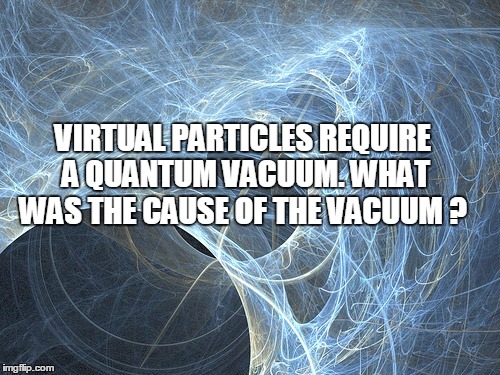
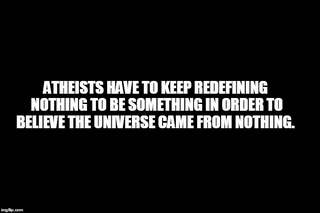
http://christiananswers.net/q-aig/aig-c039.html
Theories that the universe is a quantum fluctuation must presuppose that there was something to fluctuate their quantum vacuum is a lot of matter-antimatter potential not nothing.
http://www.reasonablefaith.org/the-caused-beginning-of-the-universe-a-response-to-quentin-smith
Tom’s Top 10 interpretations of quantum mechanics
https://www.sciencenews.org/blog/context/tom%E2%80%99s-top-10-interpretations-quantum-mechanics
https://reasonandscience.catsboard.com/t1317-virtual-particles-require-a-quantum-vacuum-what-was-the-cause-of-the-vacuum
Atheism is perfectly at home with all kinds of idiocy, superstition, and irrational nonsense like “a universe from nothing”
1. It is claimed that virtual particles caused the Big bang, and the universe into existence.
2. Virtual particles depend on a quantum vacuum, field, or bubble, which is an energy state in space. The energy in space is not nothing.
3. In order to have a quantum vacuum and field, the laws of physics are still there. That includes the electromagnetic field, the gravitational field, the Higgs field, and the fields arising from the nuclear forces. Spacetime is still there, governed by General Relativity. The fundamental constants are all still in place, all with the same values we observe them to have. And, perhaps most importantly, the zero-point energy of space is still there, and it's still at its current, positive, non-zero value. This is where the phrase, "a Universe from nothing" comes from. That's still a lot of something, and not nothing at all. The origin of all these things still demands an explanation.
4. The quantum vacuum and field require an explanation of its existence. The first cause argument of God's existence is not refuted by claiming that virtual particles caused the Big bang.
Dongshan He, Spontaneous creation of the universe from nothing 4 abril 2014
the universe can be created spontaneously from nothing. When a small true vacuum bubble is created by quantum fluctuations of the metastable false vacuum, it can expand exponentially
https://arxiv.org/abs/1404.1207v1
Claim: Metastable quantum field. Energy potential in the absense of matter. Quantum fluctuation condenses it into virtual particles of matter and antimatter. They created the Big bang, and our universe.
Reply: Virtual particles, and the quantum vacuum generating them, are far from absolutely nothing.
This is what physicists mean when they talk about nothing: Nothingness is the void of empty space. They mean however something different than "no things" at all. In order to achieve nothingness, one has to get rid of every fundamental constituent of matter. Every quantum of radiation has to go. Every particle and antiparticle, from the ghostly neutrino to whatever dark matter is, must be removed. Then there would be empty space itself. With no particles or antiparticles, no matter or radiation, no identifiable quanta of any type in the Universe, there would still be empty space itself. To some, that's the scientific definition of "nothingness." But certain physical entities still remain, even under that highly restrictive and imaginative scenario. The laws of physics are still there, which means that quantum fields still permeate the Universe. That includes the electromagnetic field, the gravitational field, the Higgs field, and the fields arising from the nuclear forces. Spacetime is still there, governed by General Relativity. The fundamental constants are all still in place, all with the same values we observe them to have. And, perhaps most importantly, the zero-point energy of space is still there, and it's still at its current, positive, non-zero value. This is where the phrase, "a Universe from nothing" comes from.
Lets contrast it now with absolutely nothing, or the philosophical nothingness: True Nothingness only occurs when you remove the entire Universe and the laws that govern it. We can conceive of removing everything we can imagine: space, time, and the governing rules of reality. Physicists have no definition for anything here; this is pure philosophical nothingness. The question is, of course: If the nothing that physicists like Krauss talk about, entails the existence of the laws of physics, the quantum fields, the electromagnetic field, the gravitational field, the Higgs field, and the fields arising from the nuclear forces, spacetime, governed by General Relativity, the fundamental constants, the zero-point energy of space, and still at its current, positive, non-zero value, which manifests itself as dark energy, then the question is: Where did ALL THIS come from ?? It's not, as many think, just virtual particles popping in and out from a quantum vacuum. Its much more. As seen that's still a lot of something, and not nothing at all. The origin of all these things still demands an explanation.
How does Krauss claim we get a universe from nothing? He writes:
This is an example of something that Guth coined as the ultimate free lunch. Including the effects of gravity in thinking about the universe allows objects to have—amazingly—“negative” as well as “positive” energy. This facet of gravity allows for the possibility that positive energy stuff, like matter and radiation, can be complemented by negative energy configurations that just balance the energy of the created positive energy stuff. In so doing, gravity can start out with an empty universe—and end up with a filled one. (Krauss, 2012: 92)
This original empty space is highly structured, first by gravity. But gravity cannot be decoupled from energy. By E = mc2, energy can be transformed into matter. Then gravity can transform matter into the galaxies that provide the home for humans. If the original empty space is structured by the law of gravity that is essentially connected to energy, you’ve really got something there. Not nothing. In short, for Krauss, nothing is not really nothing. Krauss’s quantum vacuums are highly structured somethings. So the world does not come from nothing. The somethings it comes from—that bubbling soup of energy and mass or the laws of physics or gravity/energy—make one wonder. Where do they come from? Surely not from nothing (ex nihilo, nihil fit).
It is claimed that Virtual particles are indeed real particles. Quantum theory predicts that every particle spends some time as a combination of other particles in all possible ways. Quantum mechanics allows, and indeed requires, temporary violations of conservation of energy. So they are in time, in space, and require a quantum vacuum, in the lowest state of energy. So we have to ask: What caused the energy, space, and time in which these particles pop up?
The net energy of the universe is zero
The attempt to draw metaphysical implications from the zero net energy hypothesis is a bad joke. It’s like saying that if your debts and your assets exactly cancel each other out, so that your net worth is zero, then there is no cause of your current financial condition. The suggestion that nothing exists is absurd. Not only do I undeniably exist, but according to the hypothesis, the positive and negative energy exist. So as Christopher Isham, Britain’s premier quantum cosmologist, points out, there still needs to be “ontic seeding” to create the positive and negative energy in the first place.
"Net energy is zero" is what is called a construct. It's like "the average family with 2.4 children". It's not an actual object you can point to, but something you get when you run the calculations for positive and negative elements. Do you know what you have when you have positive and negative elements? Elements. That's not nothing, that's something. Something that 1) doesn't have to exist and 2) logically cannot exist eternally. So we're back to the same question. If non-physical causation is a non-starter for you, either offer an explanation that's physical that doesn't suffer from those problems of offer an explanation as to why non-physical explanations are so repulsive.
Here, Krauss goes to the point to claim that ABSOLUTELY NOTHING could have created the universe. Thats the suicide of reason and logic
https://www.youtube.com/watch?v=ghLSHorrcoQ
God most probably exists - The universe had a beginning, therefore a cause
https://www.youtube.com/watch?v=g9UMDiiE0kY&t=327s
Nothing is the thing that stones think of
https://reasonandscience.catsboard.com/t2817-nothing-is-the-thing-that-stones-think-of
https://reasonandscience.catsboard.com/t1317-virtual-particles-require-a-quantum-vacuum-what-was-the-cause-of-the-vacuum
In quantum field theory, the quantum vacuum state is the quantum state with the lowest possible energy. The vacuum electromagnetic field in spontaneous emission, the Lamb shift, van der Waals, and Casimir forces, and a variety of other phenomena, some of which are of technological as well as purely scientific importance.
https://www.sciencedirect.com/book/9780080571492/the-quantum-vacuum
Luke Barnes, a non-creationist astrophysicist who is a Postdoctoral Researcher at the Sydney Institute for Astronomy, University of Sydney, Australia, is scathing about Krauss and those who argue like him:
First and foremost, I’m getting really rather sick of cosmologists talking about universes being created out of nothing. Krauss repeatedly talked about universes coming out of nothing, particles coming out of nothing, different types of nothing, nothing being unstable. This is nonsense. The word nothing is often used loosely—I have nothing in my hand, there’s nothing in the fridge etc. But the proper definition of nothing is “not anything”. Nothing is not a type of something, not a kind of thing. It is the absence of anything.
Physicist and philosopher David Albert
The fact that particles can pop in and out of existence, over time, as those fields rearrange themselves, is not a whit more mysterious than the fact that fists can pop in and out of existence, over time, as my fingers rearrange themselves. And none of these poppings—if you look at them aright—amount to anything even remotely in the neighborhood of a creation from nothing.—
Lee Strobel, A case of a creator :
Quantum theory ... holds that a vacuum ... is subject to quantum uncertainties. This means that things can materialize out of the vacuum, although they tend to vanish back into it quickly... . Theoretically, anything-a dog, a house, a planet-can pop into existence by means of this quantum quirk, which physicists call a vacuum fluctuation. Probability, however, dictates that pairs of subatomic particles ... are by far the most likely creations and that they will last extremely briefly.... The spontaneous, persistent creation of something even as large as a molecule is profoundly unlikely. Nevertheless, in 1973 an assistant professor at Columbia University named Edward Tryon suggested that the entire universe might have come into existence this way.... The whole universe may be, to use [MIT physicist Alan] Guth's phrase, "a free lunch."20 I closed the magazine and tossed it on Craig's desk. "Maybe Tryon was right when he said, `I offer the modest proposal that our universe is simply one of those things which happen from time to time.' “ Craig was listening intently. "Okay, that's a good question," he replied. "These subatomic particles the article talks about are called `virtual particles.' They are theoretical entities, and it's not even clear that they actually exist as opposed to being merely theoretical constructs. "However, there's a much more important point to be made about this. You see, these particles, if they are real, do not come out of anything. The quantum vacuum is not what most people envision when they think of a vacuum-that is, absolutely nothing. On the contrary, it's a sea of fluctuating energy, an arena of violent activity that has a rich physical structure and can be described by physical laws. These particles are thought to originate by fluctuations of the energy in the vacuum. "So it's not an example of something coming into being out of nothing, or something coming into being without a cause. The quantum vacuum and the energy locked up in the vacuum are the cause of these particles. And then we have to ask, well, what is the origin of the whole quantum vacuum itself? Where does it come from?" He let that question linger before continuing. "You've simply pushed back the issue of creation. Now you've got to account for how this very active ocean of fluctuating energy came into being. Do you see what I'm saying? If quantum physical laws operate within the domain described by quantum physics, you can't legitimately use quantum physics to explain the origin of that domain itself. You need something transcendent that's beyond that domain in order to explain how the entire domain came into being. Suddenly, we're back to the origins question."
Krauss - a universe from nothing
https://reasonandscience.catsboard.com/t2594-krauss-a-universe-from-nothing
Krauss: Indeed, the immediate motivation for writing this book now is a profound discovery about the universe that has driven my own scientific research for most of the past three decades and that has resulted in the startling conclusion that most of the energy in the universe resides in some mysterious, now inexplicable form permeating all of empty space. It is not an understatement to say that this discovery has changed the playing field of modern cosmology. For one thing, this discovery has produced remarkable new support for the idea that our universe arose from precisely nothing.
Answer: If we define nothing as the absence of anything, then the assertion that the universe arose from precisely nothing is hogwash and pure irrational nonsense. Nothing is the absence of anything and has no properties, not potentiality, it can't change the state of nothingness. That's OBVIOUS to any average intelligent mind.
Krauss: And if inflation indeed is responsible for all the small fluctuations in the density of matter and radiation that would later result in the gravitational collapse of matter into galaxies and stars and planets and people, then it can be truly said that we all are here today because of quantum fluctuations in what is essentially nothing.
Answer: This is probably the essence or core assertion of the book, and essentialy makes as much sense as a quacking duck :=P .
http://www.bethinking.org/is-there-a-creator/a-universe-from-someone-against-lawrence-krauss
In the face of the logically coherent answer supported by the Leibnizian cosmological argument, Krauss would dearly like to change the topic: "what is really useful is not pondering this question…" As a result, he produces a book that’s overwhelmingly devoted to questions besides the one on the front cover. Krauss anti-philosophical prejudice leads him to embrace a verificationalist stance long ago abandoned by philosophers as self-contradictory and to toy with rejecting the ultimate question of origins as meaningless. Despite this, Krauss spends a handful of pages attempting to explain why there is something rather than nothing. The attempt leads him to beg the question against theism, to reject logic in the name of science and to embrace a double standard. This kludge of fallacies convinced Richard Dawkins to put his name to the incoherent assertion that "nothingness is unstable: something was almost bound to spring into existence from it"; which only goes to show just how intellectually unstable the foundations of neo-atheism are.
David Tong: Particle Physics
The existence of quantum fields means that empty space, also known as the vacuum, is not a dull place. It is filled with quantum fields which, even when left alone, are not necessarily calm. An example is shown in Figure 4, depicting a computer simulation of empty space. What’s shown is a typical configuration of the gluon field in the vacuum. The true vacuum is, in fact, much more complicated even than that shown in the picture. The vacuum doesn’t have just a single field configuration but is something more murky: a quantum superposition of infinitely many different field configurations, each appearing with some probability. In quantum field theory, the vacuum of space is an interesting place. It froths with quantum uncertainty. The take-home message for these lectures is that the vacuum of space is not some inert, boring substance. The bubbling fields breathe life into the vacuum and mean that it is able to respond to things happening within it. This phenomenon, as we shall see, lies at the heart of some of the more subtle effects of quantum fields.
http://www.damtp.cam.ac.uk/user/tong/pp/pp.pdf


http://christiananswers.net/q-aig/aig-c039.html
Theories that the universe is a quantum fluctuation must presuppose that there was something to fluctuate their quantum vacuum is a lot of matter-antimatter potential not nothing.
http://www.reasonablefaith.org/the-caused-beginning-of-the-universe-a-response-to-quentin-smith
Tom’s Top 10 interpretations of quantum mechanics
https://www.sciencenews.org/blog/context/tom%E2%80%99s-top-10-interpretations-quantum-mechanics
Last edited by Otangelo on Tue Jan 18, 2022 5:22 am; edited 39 times in total


